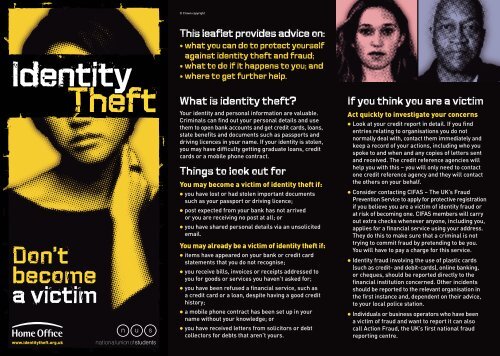2632 Student ID Leaflets Laid Up:Layout 1 - Up one level
2632 Student ID Leaflets Laid Up:Layout 1 - Up one level
2632 Student ID Leaflets Laid Up:Layout 1 - Up one level
You also want an ePaper? Increase the reach of your titles
YUMPU automatically turns print PDFs into web optimized ePapers that Google loves.
Identity<br />
Theft<br />
Don’t<br />
become<br />
a victim<br />
www.identitytheft.org.uk<br />
© Crown copyright<br />
This leaflet provides advice on:<br />
∑ what you can do to protect yourself<br />
against identity theft and fraud;<br />
∑ what to do if it happens to you; and<br />
∑ where to get further help.<br />
What is identity theft?<br />
Your identity and personal information are valuable.<br />
Criminals can find out your personal details and use<br />
them to open bank accounts and get credit cards, loans,<br />
state benefits and documents such as passports and<br />
driving licences in your name. If your identity is stolen,<br />
you may have difficulty getting graduate loans, credit<br />
cards or a mobile ph<strong>one</strong> contract.<br />
Things to look out for<br />
You may become a victim of identity theft if:<br />
you have lost or had stolen important documents<br />
such as your passport or driving licence;<br />
post expected from your bank has not arrived<br />
or you are receiving no post at all; or<br />
you have shared personal details via an unsolicited<br />
email.<br />
You may already be a victim of identity theft if:<br />
items have appeared on your bank or credit card<br />
statements that you do not recognise;<br />
you receive bills, invoices or receipts addressed to<br />
you for goods or services you haven’t asked for;<br />
you have been refused a financial service, such as<br />
a credit card or a loan, despite having a good credit<br />
history;<br />
a mobile ph<strong>one</strong> contract has been set up in your<br />
name without your knowledge; or<br />
you have received letters from solicitors or debt<br />
collectors for debts that aren’t yours.<br />
If you think you are a victim<br />
Act quickly to investigate your concerns<br />
Look at your credit report in detail. If you find<br />
entries relating to organisations you do not<br />
normally deal with, contact them immediately and<br />
keep a record of your actions, including who you<br />
spoke to and when and any copies of letters sent<br />
and received. The credit reference agencies will<br />
help you with this – you will only need to contact<br />
<strong>one</strong> credit reference agency and they will contact<br />
the others on your behalf.<br />
Consider contacting CIFAS – The UK’s Fraud<br />
Prevention Service to apply for protective registration<br />
if you believe you are a victim of identity fraud or<br />
at risk of becoming <strong>one</strong>. CIFAS members will carry<br />
out extra checks whenever any<strong>one</strong>, including you,<br />
applies for a financial service using your address.<br />
They do this to make sure that a criminal is not<br />
trying to commit fraud by pretending to be you.<br />
You will have to pay a charge for this service.<br />
Identity fraud involving the use of plastic cards<br />
(such as credit- and debit-cards), online banking,<br />
or cheques, should be reported directly to the<br />
financial institution concerned. Other incidents<br />
should be reported to the relevant organisation in<br />
the first instance and, dependent on their advice,<br />
to your local police station.<br />
Individuals or business operators who have been<br />
a victim of fraud and want to report it can also<br />
call Action Fraud, the UK’s first national fraud<br />
reporting centre.
How to protect yourself<br />
Security tips<br />
Regularly get a copy of your personal credit report (this<br />
costs from £2) from a credit reference agency to see if<br />
it includes any entries you do not recognise.<br />
Royal Mail offers a redirection service to help prevent<br />
identity fraud when you move home. Consider<br />
redirecting any post for at least a year. Be careful if<br />
other people have access to your post, particularly in<br />
shared accommodation. Collect post daily and contact<br />
Royal Mail if you think your post is being stolen. A mail<br />
redirection order may have been made in your name<br />
without your knowledge.<br />
If you move house, tell your bank, credit card company<br />
and other organisations that you deal with. To check<br />
that your personal details are secure, get a copy of your<br />
credit report two to three months after moving.<br />
Choose reputable internet cafes that completely erase<br />
the disk you were using and reinstall the operating<br />
system from scratch for each user. Don't leave the<br />
computer unattended.<br />
Credit and debit cards<br />
Cancel any lost or stolen credit or debit cards<br />
immediately. Keep a note of the emergency numbers<br />
you should call.<br />
Be careful to keep your personal information secure<br />
when using your card over the ph<strong>one</strong>, on the internet<br />
or in shops by making sure that other people cannot<br />
overhear you or see your personal information.<br />
Look after your personal documents<br />
Keep your personal documents in a safe place,<br />
preferably in a lockable drawer or cabinet.<br />
Consider storing valuable financial documents<br />
with your bank.<br />
If your passport, driving licence, chequebook,<br />
credit-card or other personal documents have<br />
been lost or stolen, immediately contact the<br />
organisation that issued it.<br />
Don’t casually throw away documents such as<br />
bills, receipts, credit- or debit-card slips, bank<br />
statements or even unwanted post in your name.<br />
Destroy unwanted documents, preferably by using<br />
a shredder.<br />
Password tips<br />
Never give personal or account details to any<strong>one</strong><br />
who contacts you unexpectedly. Be aware that a<br />
bank will never contact you to ask you for your<br />
personal identification number (PIN) or for a whole<br />
security number or password. Keep them secure.<br />
Don’t use the same password for more than <strong>one</strong><br />
account and never use banking passwords on other<br />
websites. Using different passwords makes it harder<br />
for criminals to access your accounts. Avoid using<br />
just family names or dates of birth as passwords.<br />
Keep passwords safe and never record or store them<br />
in a way which leaves them open to theft, such as in<br />
your purse, wallet or mobile ph<strong>one</strong>.<br />
Who can help?<br />
Credit reports<br />
Callcredit plc<br />
Consumer Services Team,<br />
PO Box 491, Leeds LS3 1WZ<br />
Ph<strong>one</strong>: 0870 060 1414<br />
Website: www.callcredit.co.uk<br />
Equifax plc<br />
PO Box 1140, Bradford, BD1 5US<br />
Ph<strong>one</strong>: 0870 010 0583<br />
Website: www.equifax.co.uk<br />
Experian Ltd<br />
PO Box 9000,<br />
Nottingham NG80 7WP<br />
Ph<strong>one</strong>: 0844 481 8000<br />
Website: www.experian.co.uk<br />
Information about<br />
identity theft<br />
Bank Safe Online<br />
Website:<br />
www.banksafeonline.org.uk<br />
British Bankers’ Association<br />
Website: www.bba.org.uk<br />
CardWatch<br />
E-mail: cardwatch@apacs.org.uk<br />
Website: www.cardwatch.org.uk<br />
CIFAS – The UK’s Fraud<br />
Prevention Service<br />
Website: www.cifas.org.uk<br />
CIFAS Protective Registration<br />
Service<br />
Capital House, e-state,<br />
Bankhead Crossway South,<br />
Edinburgh EH11 4EP<br />
Ph<strong>one</strong>: 0330 100 0180<br />
E-mail: protective.registration<br />
@cifas.org.uk<br />
Financial Services Authority<br />
Ph<strong>one</strong>: 0845 606 1234<br />
Minicom and textph<strong>one</strong>:<br />
08457 300 104<br />
Website: www.fsa.gov.uk<br />
UK Payments<br />
Mercury House, Triton Court,<br />
14 Finsbury Square,<br />
London EC2A 1LQ<br />
Ph<strong>one</strong>: 020 7711 6200<br />
Website: www.ukpayments.org.uk<br />
Reporting the theft or loss<br />
of post and documents<br />
Driver and Vehicle Licensing<br />
Agency<br />
Ph<strong>one</strong>: 0870 240 0009<br />
Website: www.dvla.gov.uk<br />
Royal Mail<br />
Ph<strong>one</strong>: 08457 740 740<br />
Website: www.royalmail.com<br />
Identity and Passport Service<br />
Ph<strong>one</strong>: 0300 222 0000<br />
Website: www.ips.gov.uk<br />
General fraud prevention<br />
Action Fraud – The National<br />
Fraud Reporting Centre<br />
Ph<strong>one</strong>: 0300 123 2040<br />
Textph<strong>one</strong>: 0300 123 2050<br />
Website: www.actionfraud.org.uk<br />
Crimestoppers<br />
Ph<strong>one</strong>: 0800 555 111<br />
Website:<br />
www.crimestoppers-uk.org<br />
Foreign and Commonwealth<br />
Office<br />
Ph<strong>one</strong>: 0870 606 0290<br />
Website: www.fco.gov.uk<br />
Fraud Reduction Website<br />
Website: www.uk-fraud.info<br />
Home Office<br />
2 Marsham Street,<br />
London SW1P 4DF<br />
Ph<strong>one</strong>: 020 7035 4848<br />
Website: www.homeoffice.gov.uk<br />
Internet Fraud Reduction<br />
Website: www.getsafeonline.org.uk<br />
www.identitytheft.org.uk



